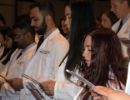
Thomas C. Mahl, MD, offered valuable advice to the Class of 2022 in his keynote address during the 2018 White Coat Ceremony.
180 Students Celebrate Entry Into Medical School
Published September 14, 2018 This content is archived.
story by alexandra edelblute
Jacobs School of Medicine and Biomedical Sciences medical students in the Class of 2022 have passed a milestone signifying the beginning of their careers: the traditional white coat ceremony.
The ceremony, carried out annually for incoming medical students, is a rite of passage symbolizing students’ commitment to professionalism and empathy in the practice of medicine.
Coat is Symbol of Noble Profession, Says Dean
Michael E. Cain, MD, vice president for health sciences and dean of the medical school, welcomed the class to the Aug. 10 ceremony and later led the class in a recitation of the Oath of Medicine.
Cain spoke about the significant, challenging journey that each class member has begun by entering medical school.
“This year you begin to assimilate the extensive fund of knowledge required to one day care for human beings who entrust their lives to you,” Cain said, emphasizing that the white coat is “the symbol of our noble profession.”
The coat is “a symbol of excellence and professionalism in everything we do, and it is a symbol of the trust one human being places in another.”
“We are excited that you are members of our UB family,” he said.
Most Students Have Performed Research
During the ceremony’s “Calling of the Class,” Dori R. Marshall, MD ’97 — who presided over the ceremony — called students individually to the stage; announced their hometowns and undergraduate institutions; and presented them with white coats, a symbol of their future profession.
Marshall noted that many members of the Class of 2022 have experience with basic, clinical and social science research. “The vast majority of you have performed research,” she said.
Students have conducted studies in areas and on topics ranging from auditory neuroscience to rat hippocampal microinjections and studies examining olfaction in type 2 diabetic rats.
Many carried out their research at locations including the National Institutes of Health, Roswell Park Comprehensive Cancer Center and Oishei Children’s Hospital.
“In this research institution, it is our hope that many of you will grow and develop your research interests and abilities in your time here at the Jacobs School,” said Marshall.
Various Interests, Volunteer Experiences
Members of the Class of 2022 have a wide variety of interests, and this is reflected in the fact that as undergraduates, they majored in a collective 42 different fields, including economics, history, German, Spanish, East Asian Studies and biology — the most prevalent major.
Class members have traveled around the world to provide assistance to people in Brazil, Chile, Costa Rica, the Dominican Republic, Ecuador, Gabon, Ghana, Haiti, Honduras, India, Indonesia, Nicaragua, the Philippines and Zimbabwe.
They have volunteered in homeless shelters and through organizations and programs such as crisis counseling, Jericho Road Community Health Center, Vive, Americorps and Habitat for Humanity.
Marshall noted that a number of the students are talented in the arts — including dance, music and photography — and sports such as rowing, soccer, fencing, track and field, swimming and football.
Mahl Delivers Keynote Address
Thomas C. Mahl, MD, professor of medicine in the Division of Gastroenterology, Hepatology and Nutrition, gave the keynote address.
Using humor and entertaining anecdotes, he expressed his enthusiasm for practicing medicine and extolled the benefits of being a physician. But Mahl also emphasized the seriousness of a career in medicine and offered thoughtful advice based on his nearly four decades of experience.
“You will have the privilege, really the honor, to serve the suffering … but, of course, with privilege comes duty and with rank come obligation and responsibility,” he noted.
“You have the responsibility to be honest and truthful. To hold patients’ secrets and respect their fears. To support them when they are weak and afraid. Their needs supersede your needs — always,” he said. “You must act in their best interest even when it’s not in your best interest. You have the duty to be smart … You have the responsibility to continue to learn because, unfortunately, there is no lasting truth.”
At the close of his address, Mahl left the first-year students with an important piece of guidance: During difficult times, they should remember their initial motivations for wanting to become physicians and let those reasons guide them through their challenges.
Mahl, the chief of gastroenterology at the Buffalo VA Medical Center, has expertise in liver diseases such as hepatitis, alcoholic and non-alcoholic liver disease, cirrhosis, ascites and portosystemic encephalopathy.
Marshall Honored With Humanism Award
Dori R. Marshall, MD ’97, assistant dean and director of medical admissions and an assistant professor in the Department of Psychiatry, was presented with the Leonard Tow Humanism in Medicine Award.
A specialist in adolescent psychiatry, Marshall’s primary clinical interest is caring for young adults who need acute inpatient hospitalization.
She mentors residents and fellows, and she teaches medical students during their psychiatry clerkship. Additionally, through the Human Rights Initiative, she works with medical students to support survivors of torture and political violence who are seeking asylum in the United States.
In her role as director of medical admissions, Marshall — who chairs the school’s Faculty Council Committee on Admissions Policy — is committed to ensuring a holistic approach to screening and interviewing prospective students.
The Tow Award is sponsored by the Arnold P. Gold Foundation and recognizes a faculty member who demonstrates outstanding compassion in the delivery of care; respect for patients, their families and health-care colleagues; and demonstrated clinical excellence.








